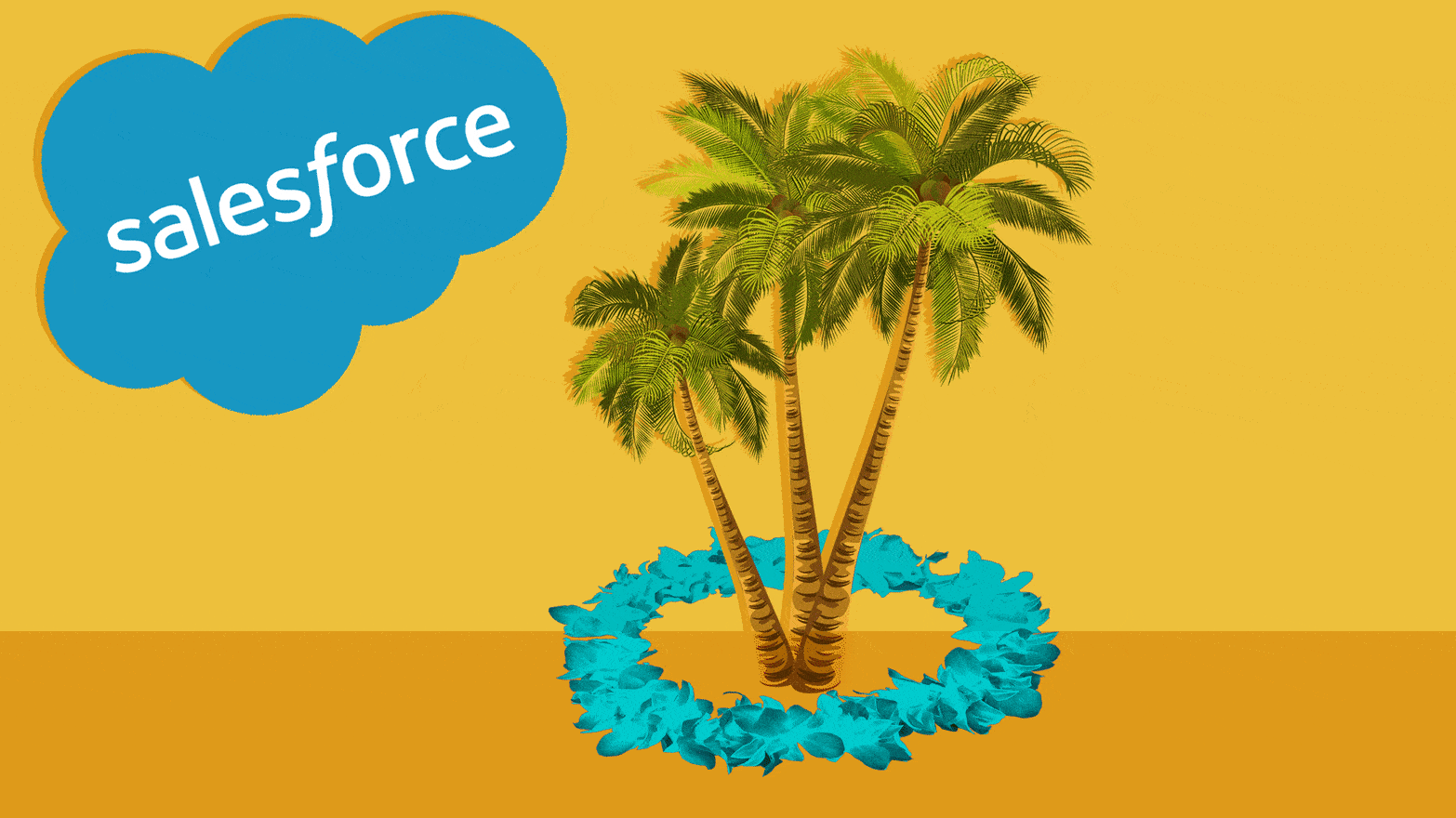San Francisco’s largest employer—and owner of the city’s tallest skyscraper—is toning down its obsession with Hawaii.
After employees raised concerns of cultural appropriation in late 2018, the business software company Salesforce convened focus groups of native Hawaiian employees. Concerns raised in those talks led Salesforce to remove Hawaiian terminology from its internal branding, according to a source in the Salesforce Office of Equality who spoke on condition of anonymity. Just 57 of Salesforce’s 21,148 U.S. employees identify as Hawaiian or Pacific Islander, according to its 2018 diversity report submitted to the Equal Employment Opportunity Commission.
Salesforce, worth $126 billion, has used effusive, happy-go-lucky Hawaiian imagery and terms since its founding in 1999. Its workforce is known as the “Salesforce Ohana,” named after the Hawaiian word for family that bears a broad connotation of kinship. The company encourages employees to tag #SalesforceOhana in social media posts, decorates its offices with tropical foliage, gives conference rooms names like "Maka Launa" and "Hala Kahiki," and christens new employees with leis. At Salesforce, every Friday is “Aloha shirt day.” Many business publications have ranked the company as one of the nation’s best places to work.
CEO Marc Benioff, estimated to be worth $6.1 billion, is perhaps the touchy-feely culture’s biggest proponent. The origin story of Salesforce begins in part with a vacation he took to Hawaii just before founding the company where he “swam with dolphins and embraced the spirit of Aloha,” according to the company blog, which defines Aloha as “treating those around you like family.” He returned with a mission to spread the good word, using enterprise software as his missionary vehicle. He named his dog Koa, which translates to “brave” in English, and dubbed the canine the company’s “chief love officer;” bought a Hawaiian estate, gave away a Hawaiian sculpture worth $7.5 million (maybe, it’s not clear it’s authentic), donated to volcano recovery efforts, and wore a lei during his opening keynote at the company’s annual conference last year.
But no more. Sort of. A company spokesperson said Salesforce will remove some of the internal branding, but not all of it.
“As part of our commitment to equality, we have made the decision to move away from our use of Hawaiian terminology while preserving a few key terms core to our company’s philosophy and culture,” a Salesforce spokesperson said in a statement to The Daily Beast. She declined to specify which key terms the company would retain. The Ohana abides, it seems.
How soon the change will occur is unclear. Benioff blessed a new Salesforce office space, the Salesforce Tower New York Ohana Floor, with a Hawaiian prayer in June.
Outside of his Hawaiian propensities, Benioff enjoys a reputation as a pioneer of diversity and philanthropy efforts in Silicon Valley, spending millions to correct pay imbalances between men and women at Salesforce and donating hundreds of millions to San Francisco hospitals. He advocates for other billionaires to give more and sometimes tangles with them over city politics. Salesforce itself has bequeathed 1 percent of its equity to charity at his direction since its founding in 1999. The company maintains a Department Of Equality to support the wide variety of employee resource groups that operate within the company. Vox declared in 2017 that Benioff was “raising the bar as a woke CEO.”
Bloomberg reported in September 2018 that employees were debating whether the Hawaiian references appropriated native Hawaiian culture or honored it on company message boards.
One employee, Andrew Afram, wrote at the time, “We do things that may feel Hawaiian, but that are not Hawaiian. All references to Hawaiian culture at Salesforce that I’ve seen firsthand have been appropriation, misappropriation, or misrepresentation.” Afram, who is still with the company, declined to comment on the impending removal of the terminology to The Daily Beast. Others defended the theme, saying that the company was celebrating Hawaiian life.
Tony Prophet, Salesforce’s Chief Equality Officer, reportedly wrote on the same message board: “Some of the specific examples cited in the post and comments are problematic. We absolutely recognize there is more work to be done.” Prophet did not reply to a request for comment.
But Salesforce may not be making as much progress as it would like. Blaine Kaho’onei, a Hawaiian Salesforce employee who’s been with the company for 15 years, commented recently on a Salesforce story about company culture posted to LinkedIn.
“Now if we could just finally spell ʻOhana correctly. 😞😊”

